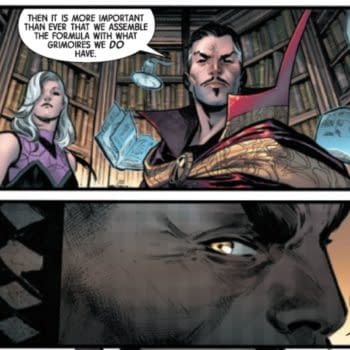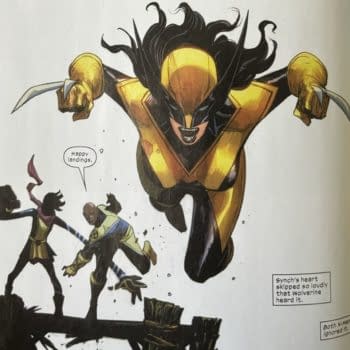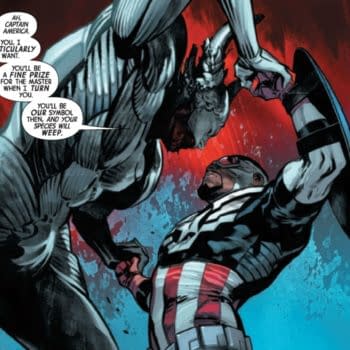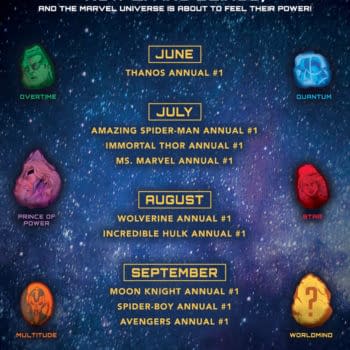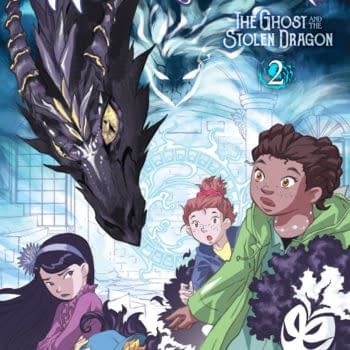Posted in: Comics, NYCC | Tagged: comic con, entertainment, new york, new york comic con, NYCC, nycc 2016, nycc16
Peter David Talks To Bleeding Cool About *That* New York Comic Con Panel (VIDEO UPDATE)

Sofia Annunziata wrote the following report for Bleeding Cool regarding the X-Traordinary: The LGBT Characters Of The X-Men panel she attended at New York Comic Con.
Things have moved on a little since then. But she reported it, thus;
Moderated by Jude Biersdorfe, included seasoned X-Men writers Chris Claremont and Peter David, as well as Max Wittert and Daniel Ketchum. During the panel they touched upon a variety of the LGBT characters in the X-Men universe from the first gay kiss between Shatterstar and Rictor in X- Factor #45 to Iceman learning how to talk to men at a gay bar in X-Men #13.
Due to Comics Code restrictions, LGBT content (if any) was often discreetly flown under the radar, but as times changed and restrictions were thrown out the window, creators decided to take a more direct approach. Writer Peter David didn't seem to think off the kiss between Rictor and Shatterstar as anything other than another kiss. It wasn't as if the kiss had a whole page dedicated to it, it was in panel 5 out of 6 overall panels. However fans were all over it, in both positive and negative ways. Since then LGBT content in X-Men has continued to grow and will continue further. Creators are looking to explore more in terms of intersectionality as well as exploring non-binary characters.
Opening up Q&A proved to be an interesting experience as some fans cried and thanked the panelists for creating content that they could relate too, while others went off the LGBT track to talk about other inclusion issues, and some rather touchy subjects like the portrayal of Romani people in comics. That particular topic ended with some displeased audience members leaving before the Q&A was over.
However, the overly emotional Q&A session didn't take away from the experience and the panel proved to have insight on how LGBT characters have evolved through the X-Men timelines.
And yes, it was the Romani question that caused considerable discussion. Earlier in the show, the questioner had asked a similar question at a different panel. This time it got a different response, specifically from Peter David.
Panel attendee Adam posted on Tumblr,
The second person up introduced himself as a Romani activist, and launched into what wasn't so much a question as a long plea for writers to stop using the g-slur and for his people to get better representation. He ended by lobbing a super-softball "do you guys agree" question at the panel.
At that point, before anyone else could speak, David glared at the man and said something along the lines of "do you really want to ask me that question." The room went dead silent. He then launched into a diatribe about having been in Romania "for the movies" (not really sure what that meant) and seeing a child pulling "itself" along behind its mother because both of its legs were broken. His guide then told him that "g*****s do that to their own children to make people want to give them money" (paraphrasing). David concluded by telling the man (again, paraphrasing) "I saw those broken children, so don't complain to me about the suffering of the Romani people". When the man tried to respond from the back of the room, David shouted "I don't care" over and over, eventually driving the man out of the room. People were fucking shocked. A lot of people in the audience were muttering "no dude" and "stop" while he was getting into it, and everyone was clearly uncomfortable, but the Q&A kept going for a few more minutes. As the panel ended and everyone was walking out, David leaned in to the microphone and apologized, saying that "the Romani situation is a very sensitive subject" to him.
There was other reaction on-line, similarly concerned.
I talked to Peter David afterwards. He referred me to an article he wrote for the Comic Buyer's Guide in the nineties, from his But I Digress… column.
And he sent this explanation.
I should have kept my big mouth shut.
I am attending the New York Comic Con and was on a panel about gays in comic books (characters, not creators, although half of the panel was in fact gay.) Everything was going fine. We all chatted about the subject for forty five minutes and then we threw it open to the audience for questions. And that's where it went off the rails.
The second person to speak then proceeded to do one of the things that I always tell people not to do: rather than ask a question, he began a rambling speech about the Romani and the way they are portrayed in comics, and eventually got around to saying that he hoped we would strive to give the Romani a fair shake in our books.
Now if I had half a brain, what I would have said was:
"Well, as I recall, Quicksilver is Romani. And everyone hated him until X-Factor #87, and after that issue came out, everyone loved him. So I'm certainly doing my part." And everyone would have applauded and we could have moved on to the next question.
But no.
Now trying to turn a discussion of LGBTQ concerns into a discussion of Romani concerns seemed dubious at best considering that the Romani religion despises homosexuality. But that is a debate for another time.
The larger problem was that suddenly my mind flashed back to 1993, when I was in Romania, in Bucharest, for the filming of a movie there. I was being guided around and then I saw something. And I wrote about it back then, and I will reprint the pertinent section here:
We go into the department store, take the escalator to the third floor. As we pass the second, I can't believe what I see.
A child, a girl, somewhere between five and eight years old, is following her mother, calling after her. Her skin is dark. She might have been beautiful, if given a chance.
She is on her knees. Walking on her knees.
Sort of.
Her legs don't bend back. They are bent forward, at the knees.
Her body is teetering at about an 80 degree angle, like a Gumby or a collapsing marionette. She half-pulls, half-shuffles along, sliding on her calves.
My guide sees what I've spotted. His face is impassive.
"What the hell is wrong with her?" I whisper. Grasping at the only explanation I can, I say, "Chernobyl?"
"Gypsies," he replies.
I don't understand, and tell him so.
"You see a lot of gypsy children like that," he explains. "When they're a few months old, sometimes their parents break their knees or their elbows, or put out an eye. They figure it will help them make more money when they beg."
I nod.
We are looking at chairs, but I'm picturing a child who looks like my eight-year-old daughter, walking on reversed knees, calves scraping along the floor making sounds like sandpaper. We are buying the chairs, but I'm picturing a baby who looks like the smiling one waiting for me at home, howling as a mallet or a sledge hammer or maybe a jagged rock shatters her joints.
We get the chairs, and go out a different exit. There's another gypsy child, begging. A boy. His legs go the wrong way. I'm in a Stephen King novel and can't close it. I take his picture from behind, unable to face him.
I buy a case of Coke for the cast, get back into the van, and almost break down.
I return to the set but am unable to remain. I can't get into filming make believe. A number of off-duty cast members are going into town. I go with them.
We see no more Roger Corman-esque children. But there is one boy, begging, who is being yanked to his feet by his father, yelling at the boy and clearly prepared to cuff him because however much money he might have taken in to that point, it obviously wasn't enough.
Clabe Hartley, who portrays our main villain, is watching. Clabe has a stone-cold dangerous stare. Clearly he's considering whether or not to make a move. Clabe's in terrific shape, versed in various fighting techniques; he could take the guy apart. The problem is that Clabe would wind up in jail, and the child would wind up in traction or on a slab when his father got through taking out his humiliation on the boy.
I'm not sure whether the father is aware Clabe is observing him. Perhaps he is, because abruptly he settles for yanking the boy to his feet and dragging him away. Clabe paces him for half a block, moving like a panther, still weighing options, before slowing and turning away.
There's nothing he can do.
Nothing anyone can do.
All of that went through my brain and cold anger ripped through my head. I growled, "You really want to do this?" and suddenly the crowd got very quiet.
I related what I had seen twenty-plus years ago. As I spoke I became more and more furious, remembering it so vividly.
The guy tried to talk back, and I didn't want to hear it. I said we were done talking about it. He kept trying to pursue it. And I blew my stack. Twenty years of remembering what I had seen bubbled over and I shouted at him that we were moving on to the next question.
People were visibly stunned. I had never gone off on a fan in thirty years of being a professional, and believe me, plenty had tried to provoke me. The panel then moved on and at the end I apologized to the audience for losing my temper.
It wasn't enough, of course. The internet erupted. "Peter David goes off on racist rant!" Everyone expressed disapproval, scowled because I'd been upset.
I guess my question is:
Why are people angry that I got upset about the crippling of children?
Was I right to shout at the guy? Of course not. I don't believe for a moment that he endorses the behavior. That's why I apologized.
But am I sorry that the thought of what poor Romani are doing in Bucharest still upsets me to this day? Causes me to have such an angry, visceral reaction? Not for a second. The question shouldn't be, Why did I get angry? The question should be, Why didn't others get angry?
Do I believe Romani should be persecuted? Of course not. The way I've written Romani characters should make that obvious.
But this is the 21st century, and in the 21st century, you're not allowed to form an opinion based upon things you've been told by people who live there, and things you've seen with your own eyes, and photographs you've taken. Apparently the only thing that matters is the sensitivities of activists, and if you take issue with actions that the people they represent have taken, then clearly there is something wrong with you.
Screw it. If people want to declare that I hate the Romani, fine. I'll log that right in with Peter David Hates Catholics (even though my wife and youngest daughter are Catholic, the latter about to celebrate her confirmation) and Peter David is anti-Semitic (even though I'm Jewish) and Peter David hates gays (that one's my favorite because it broke during the exact same month that I got a GLAAD Media Award.)
And maybe in this case it might have some positive effect. Maybe it will prompt people to actually do some research and get into Bucharest and save these children from abusive parents who see them solely as a means of begging. Maybe something positive will come from it.
You tell me.
From my perspective, of someone who didn't attend the panel, it's this. What David saw and described is, to anyone, utterly shocking and he portrays the events vividly. But appearing to conflate that experience with the Romani ethnic identity or religion as a whole is something else entirely. And is comparable to… well, plenty of other upsetting comparisons.
You will draw your own conclusions, and they may be different from my initial reaction. But I did want to, in this matter at least, demonstrate both sides of the story.
UPDATE: A video of the incident has been uploaded to YouTube.
We also have come comments from fellow panelist Chris Claremont, courtesy of one of the many Bleeding Cool reporters at the show.
Hugh Sheridan: Peter David made some provocative comments about Romani people in your panel, do you have any thoughts on that?
Chris Claremont: Eh … that's a question for Peter.
HS: Do you have any opinion about the use of the word "gypsy" in connection with Romani characters like Doctor Doom, Scarlet Witch and Quicksilver?
CC: The use of the word "gypsy" – it probably falls under the rubric of – it was the 60s we used whatever words were available – it was basically a happy go lucky naiveté and an ignorance of real world circumstances, the comic book application or the popular culture – because it applies just as effectively to television – is totally different from Peter's expression of opinion which was – that comes out of something he felt and saw which – I don't think it was the time or place for that, but what's done is done.








